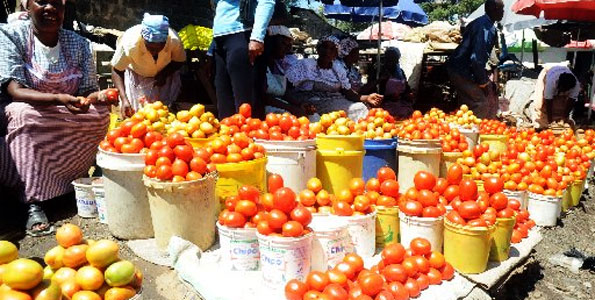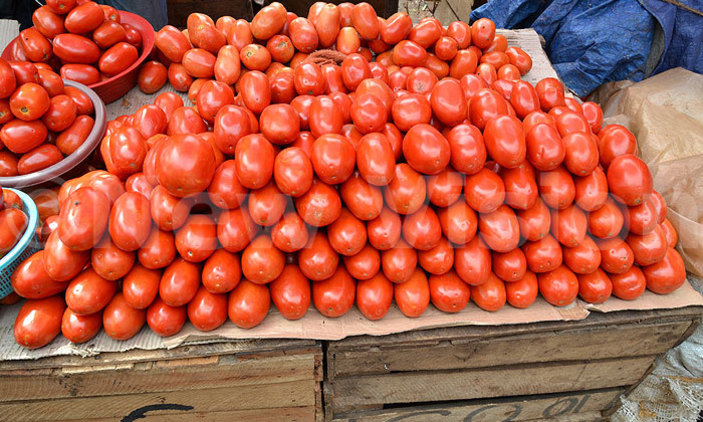
Tomato trader in an open air market. The influx of tomatoes has eases the cost of the commodity. Photo by Business Daily
Retail traders are making more money with the influx of tomatoes, which has cause the wholesale cost to drop in half, about two months after the drought.
Consumers are also enjoying cheap tomatoes, which had become a ‘luxury’ to many families as the shortage bit on during and shortly after the five-month long drought of November 2016 and March 2017.
The cost of a 64kg crate of tomatoes, that cost up to Sh6,800 in town like Eldoret by the beginning of May, has dropped to Sh2,400.
“I remember buying a crate of 64kg as Sh5,200 in April. I had to sell expensively to recover my money back. But customers also reduced their budget of the tomatoes, which they had to use only on ‘special’ foods because they were unaffordable.”
“Instead of making a profit, I made a loss as the tomatoes depreciated and rotted away as buyers shied off, ” Nyaboke Nyang’wechi, a trader at Kangemi open air market said.
From February to early May, one tomato of about 250g was costing Sh10. The cheapest tomatoes were sold in clusters of three at Sh20 or Sh25.
“I have bought three tomatoes at Sh5. These are the same ones I was buying at Sh15 in May. The size of the cluster of four tomatoes selling at Sh20 was costing Sh50,” said Kathambi Pamela, a shopper.
READ ALSO: Ripe tomatoes sold for 30 days
READ ALSO: Tomato prices rising against low supply
READ ALSO: Tomato farmer lights lantern at night to trap more fruit flies
In Nairobi, the wholesale price of the 64kg tomato crate is Sh2,300. When tomatoes are more affordable, people tend to buy more and use more in cooking, the trader said.
The vegetable seller said unlike during the shortage, when one struggled to recover the invested cost, currently, she makes between Sh1,500 to Sh2,000 more on the every crate. She sells it within two days.
“I do not buy completely ripe tomatoes. Some of my regular customers prefer half ripe, which they mix in the bulky purchase,” she said.
A spot check within the open air market revealed that one can buy three tomatoes at Sh5. Depending on the size and quality, there are variations in costs of three for Sh10 to four tomatoes for Sh20.
The wholesale price do the crate is Sh2,200 in Mombasa while those in Kisumu are parting with Sh2,500. Nakuru and Malindi are paying Sh2,200 and Sh2,240 respectively, according to Soko Pepe+, an online commodity monitoring platform.
Subukia, Kinangop, Loitoktok are some of the main tomato producing areas. The production of the tomatoes is mostly pegged on rain for open field and irrigation for greenhouse farming.
Write comment (0 Comments)
















